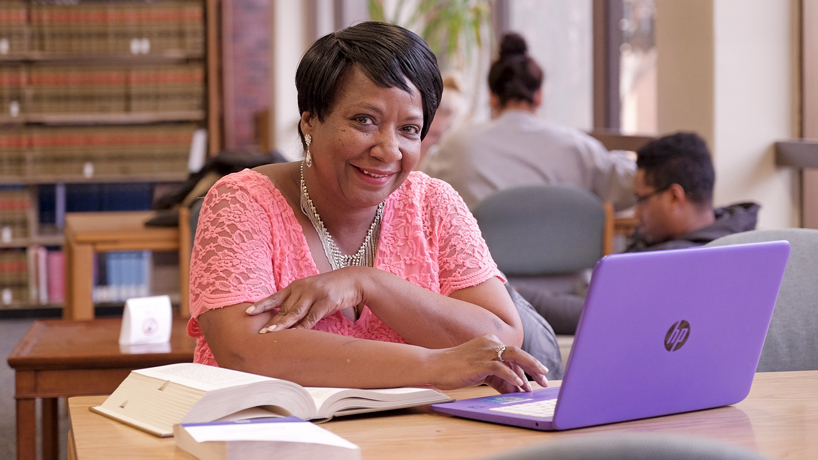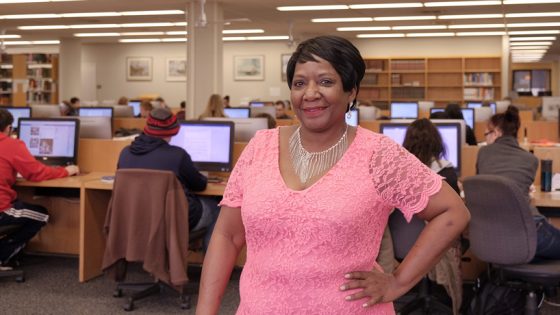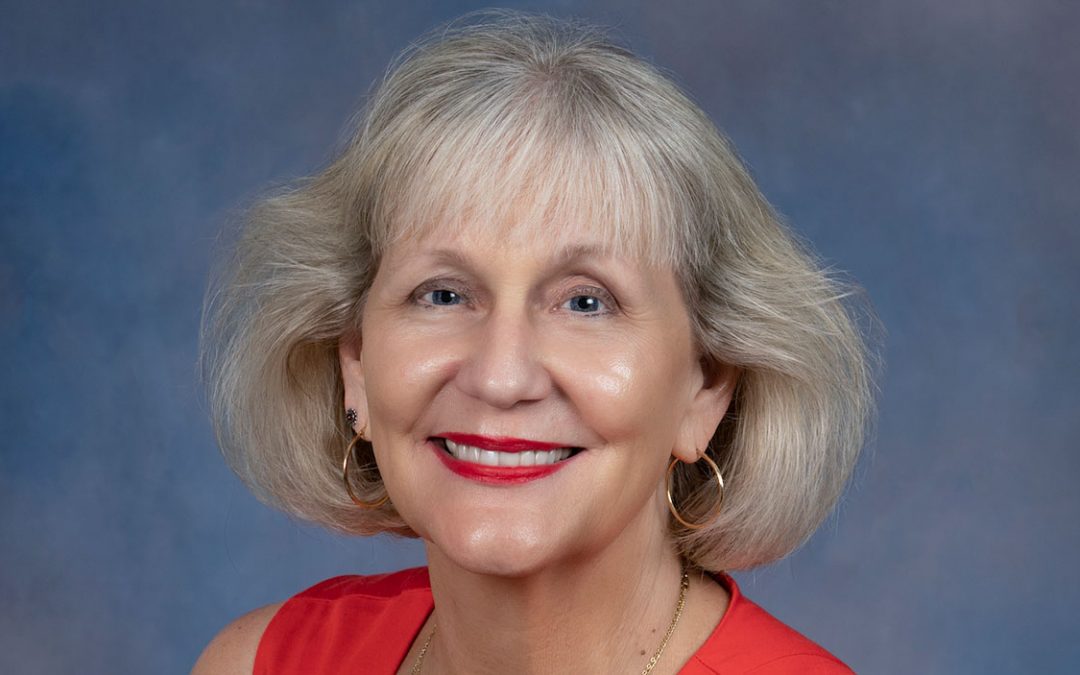
“Take a chance on yourself. Believe in you. Just go for it,” says UMSL’s Gloria Smith to other potential students who might be anxious about returning to school later in life. “If I can be in here with all these young folks, anybody in the world can.” (Photos by August Jennewein)
Campus photographer August Jennewein was on the lookout for a great shot of a different University of Missouri–St. Louis student when liberal studies major Gloria Smith jumped into his frame.
“Take a picture of me,” she told him, bright smile beaming. “I’m the oldest student on campus.”
Jennewein laughed and complied.
“I’m really not the oldest,” Smith clarifies during an interview held several weeks later. “I was just messing with him.”
It’s true that there are and have been other students on UMSL’s campus who outrank her when it comes to age. But at 54, Smith is the first to admit that she does fall into the “untraditional” category.
The senior – in terms of her academic year, that is – says she thinks she’s technically supposed to graduate in December 2017.
But honestly? She doesn’t really care about that.
“I don’t pay attention to how many classes I have left,” Smith explains. “I’m just going to continue to go to school – probably for the rest of my life – because there’s a lot to learn.”
A lot of what Smith is learning has to do with psychology, one of the special emphasis areas she has chosen for her liberal arts journey.
The study of human behavior is something new for the mom of two and grandma of one who earned her associate degree in business from Southwestern Illinois College back in 2002. Yet there’s something familiar about the subject, too, because what it’s teaching her most, Smith says, is more about herself.
“It may sound a little funny for someone to just be learning about themselves in their 50s,” she says, “but it’s true. It has really helped me to understand myself more and not be so hard on myself.”
Being too hard on herself is something Smith has often struggled with – for many reasons.
Born in tiny Wyatt, Missouri – population 319 as of the 2010 census – she moved to East St. Louis, Illinois, when she was 5 years old. From then until age 17, she grew up in foster care.
“I went through a lot of traumatic events as a child,” Smith recalls simply, earnestly, and still with kindness lighting her eyes. “I was always intrigued about human behavior, but then the way I grew up, I was always intrigued about why I was the way I was and why my life – just – why it went the way it went.”

Gloria Smith is pictured here in the midst of the Thomas Jefferson Library, where upon completing her first 15-page paper, she proudly proclaimed out loud, “Yes! I did it!”
The way it went was toward other people – toward motherhood, friendship and an abiding love for all those around her.
That’s another reason Smith says psychology is right for her.
“I love anything that has to do with people. Talking to people, helping people, being with people. That’s for me. That’s my thing.”
When she’s not at UMSL, Smith works part-time for Easterseals Midwest, assisting disabled adults who need help with personal care or daily living tasks.
Her life is full of young people whom she’s taken under her wings, most likely, she says, because of her experience being an older foster sister to kids who grew up as she did – not quite knowing at times who they could trust or whose love was real.
She also runs a makeshift food pantry of sorts, by way of her own means, in the apartment complex she calls home.
“What I do is I take canned goods and some other dry goods I have, and I put them in the laundry room and leave them there,” Smith says of her efforts.
The items disappear as the laundry loads come and go. She replaces them whenever she can.
“I’ll never know who it is that’s taking it, but I don’t care. I just want them to get it. Somebody can always use something. There are a lot of hungry kids out there.”
Although Smith devotes so much time to others, she is absolutely adamant that no one can take the place of her own two daughters.
When she’s asked what her greatest accomplishment is, both of their names are her answer.
“Mia and Danielle,” she says while pointing to their smiling faces on her lit-up cell phone. “They are so awesome. They love God, love people, are honest young women with standards. They’re independent, strong, intelligent.”
And most importantly?
“They have no self-esteem problems. I’m most grateful for that.”
Self-esteem is something Mia and Danielle helped their mom tap into when she was anxious about returning to school.
“When I first signed up, I went right back and dropped all the classes. I was terrified. The students are my kids’ age and I’m their mom’s age. But then my daughters said, ‘No, Mom. You wouldn’t let us do that.’ So I went ahead and signed back up.”
At first, Smith admits, she just “went to class and went home.”
It took a little time to steel her nerves – to realize that getting perfect grades, finishing fast, checking all the traditional boxes, wasn’t the point.
“I stopped being terrified,” Smith says. “I was like,‘Okay. I need to walk around.’”
So she did.
She found her adviser’s office. She found the library. She found the Math Academic Center and the Writing Center, where she says she met “a lot of nice young folks who were willing to help.”
In fact, UMSL’s Writing Center provided lots of encouragement when it came time for Smith’s first lengthy paper.
“When I heard 15 pages,” Smith remembers, “I thought, ‘That’s like 1,500.’ But when I finished, I was here in the library and I was like, ‘Yes!’ out loud. ‘I did it!’ The young folks around me said, ‘Hey, you really did.’”
Smith says much of her initial anxiety revolved around those types of perceived gaps in her knowledge or abilities – around a sense of “everyone else will know how to do this and I won’t.”
Now, her perspective is different. Sure. Those gaps are sometimes there. And so what?
She credits professors like Bettina Casad for helping her tap into the joy of reveling in those unknown spaces.
“I walked right up to Dr. Casad one day after class,” Smith says, “I just loved her and her class – it was social psychology – and I said, ‘Dr. Casad, I thought I knew something. I didn’t know nothing!’”
As Smith treks onward – two years in and closer than ever before to that graduation date she’s unconcerned with – does she still have moments of panic or fear?
Sometimes.
But then her daughters, coupled with each of those unexpectedly warm and friendly faces on campus, remind her of a piece of advice she was given long ago by a steady, strong voice she’s never forgotten.
“Wait to worry,” Smith says, before describing a foster mother from her past. “It was my Big Mama, Ernestine – we called her Big Mama – and she would say, ‘Wait to worry.’ Because you get ahead of yourself and things may not turn out the way you think they will. They may be better than what you think they will be.”
As Smith reflects now, she says that advice is the best she can offer to other so-called “nontraditional” students who want to study but feel afraid.
She also affirms Ernestine’s predictions about both time and things.
“They have been better for me. Yes. They have.”
About her endeavors at UMSL specifically, Smith adds one last thought.
“Now my friends say, ‘You’re always talking about school,’ and I say, ‘Well yeah, because before we were always talking about stuff that didn’t matter. But this matters. A lot. There’s always more to learn.’”















